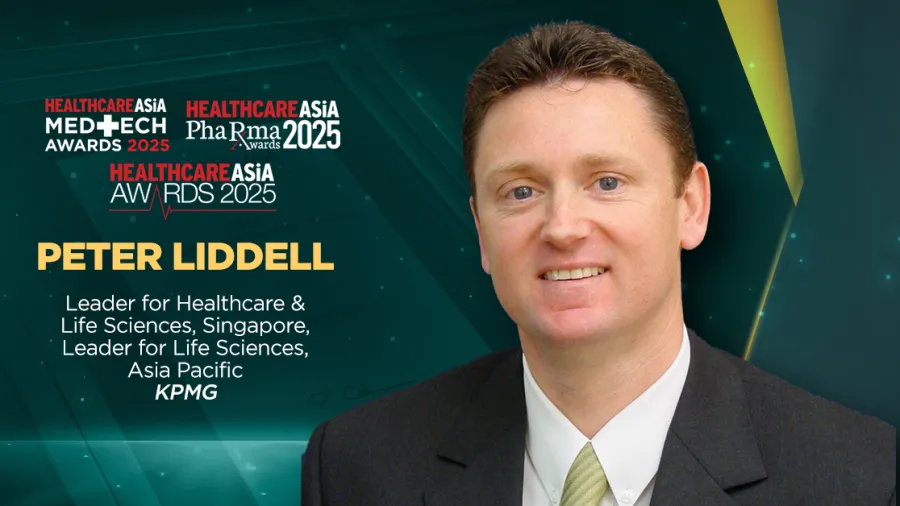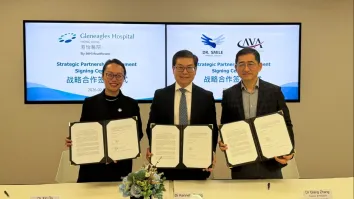
KPMG’s Peter Liddell advocates resilient healthcare solutions
He discussed the pressing challenges and transformative solutions shaping the future of healthcare in the Asia Pacific.
The healthcare industry in Asia Pacific is fundamentally evolving but faced with challenges. To stay resilient, healthcare organisations must embrace innovation, sustainability, and patient-centred care models whilst driving transformative solutions to address these growing concerns.
Offering valuable insights is Peter Liddell, Leader for Healthcare & Life Sciences at Singapore and Life Sciences for the Asia Pacific region at KPMG Services Pte. Ltd. With 35 years of experience, he has supported global and domestic clients in healthcare services, pharmaceuticals, medical devices and MedTech, consumer health, and nutrition, helping them enhance operational and financial performance.
As KPMG's Global Operations Centre of Excellence Leader and Global Sustainable Supply Chain Solution Leader, Liddell drives supply chain, logistics, procurement, and advanced manufacturing initiatives. He is renowned for designing large-scale transformation programmes that reduce complexity, optimise costs, and enable growth. His expertise spans operational strategy, supply chain advisory, supply chain and logistics advisory, business process analysis, improvement, and redesign, and project, change, and risk management.
In a recent interview, Liddell, as a judge at the Healthcare Asia Awards 2024, highlights the pressing challenges the healthcare sector faces in the Asia Pacific amidst promising growth, the need for transformative solutions through technology, patient-centred care models, and ESG integration to ensure sustainable and equitable healthcare outcomes.
Transforming healthcare in Asia Pacific
As the healthcare and life sciences landscape in the Asia Pacific continues to evolve, Liddell views the region as consistent with the current global outlook but faced with challenges that need to be addressed to ensure consistent and sustainable healthcare outcomes in the coming years.
In the life sciences sector, whilst many CEOs are optimistic about growth, critical issues remain, such as cybersecurity risks, supply chain disruptions, inflation, and the workforce, which is deemed the top challenge.
“We see almost half of global life sciences CEOs ready to increase investment to develop workforce skills and capabilities,” Liddell explains.
The healthcare sector faces waves of crises affecting systems globally, including ageing populations with rising chronic disease burdens, persistent workforce shortages, and the adverse effects of climate change. These challenges often compromise affordability, accessibility, and quality of care.
Liddell emphasised that changes to how healthcare systems operate will be fundamental in the future, saying, “Healthcare leaders should be seeking transformational and innovative approaches to sector problems as traditional interventions are no longer effective given the magnitude of the sector’s unprecedented challenges.”
To prepare for the evolving demands of the Asia Pacific healthcare market, Liddell highlights the importance of resilience by leveraging emerging technologies like AI, automation, and IoT to improve productivity and enhance patient experiences; reimagining healthcare delivery models beyond traditional hospital settings, such as hospital-in-home, outpatient models, accelerated transitions of care, and community-based care; and focussing on future-proofing their workforce.
As climate change poses significant risks to human health, with extreme weather events, food-system disruptions, and the spread of infectious diseases, and with the sector facing rising costs associated with these impacts, Liddell points out that healthcare organisations must incorporate ESG practices.
He suggested that organisations must assess ESG-related risks, set decarbonisation targets, and ensure organisational readiness through training and system improvements.
“There are many strategies available to contribute towards lower carbon emissions, but investing in the right ones will take research and proper vetting,” he noted.
When discussing the transformative role of AI, digital health, and telemedicine, Liddell highlights their ability to revolutionise healthcare delivery. AI, for instance, can handle routine tasks, allowing healthcare professionals to dedicate more time to patient care.
“We see AI and telemedicine reshaping care models also,” Liddell added. Digital health innovations enable models such as hospital-in-home and virtual wards, where patients are monitored remotely whilst recovering at home.
Looking to the future, Liddell foresees several key trends transforming healthcare. “Agentic AI will be a top trend come 2025 to help healthcare organisations realise significant value by alleviating administrative burdens, reimagining workflows, and driving productivity and impact across the entire healthcare value chain,” he said.
Additionally, data will become an invaluable asset, enabling collaboration and innovation across patients, providers, and payers. Liddell also underscores coordination between primary care and hospitals.
“Moving integration upstream to tackle social determinants of health issues as a first step to addressing health inequities,” he added.
Strong primary care networks, underpinned by advanced technology and multidisciplinary teams, will focus on preventive and proactive care to avert hospital admissions and address complex health needs. Meanwhile, he sees that hospitals will specialise in emergency care and complex procedures, supported by technology and remote care capabilities.
Recognising excellence in healthcare
As a judge for the Healthcare Asia Awards 2025, Liddell emphasised the importance of key qualities based on the nominees’ contributions to medical innovation, quality of care and delivery, patient outcomes and experiences, and equitable healthcare. These criteria reflect his belief in recognising organisations that not only address current challenges but also drive the industry forward with visionary solutions.



















 Advertise
Advertise





